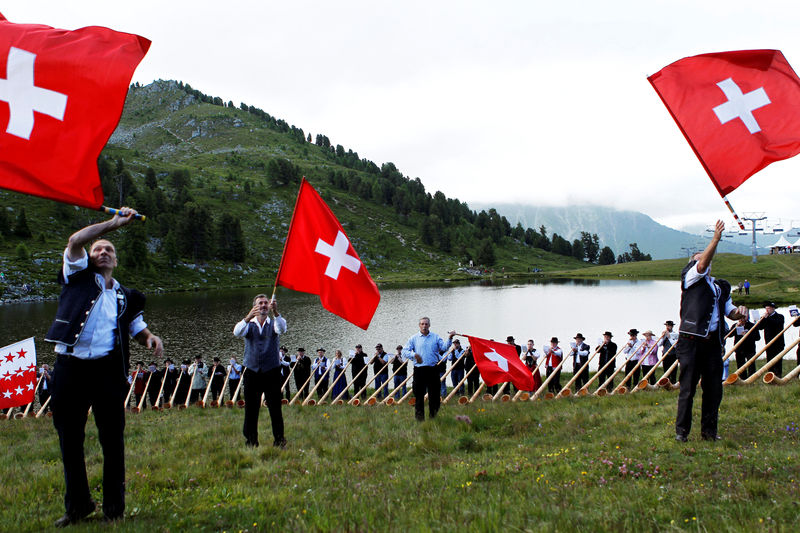By Michael Shields
ZURICH (Reuters) - Switzerland's central folk legend - a crossbow-wielding William Tell having to shoot an apple off his son's head as punishment for defying Hapsburg domination - says a lot about how the Swiss still view foreign entanglements: with suspicion.
Neutral, mountainous and land-locked, Switzerland is torn between ties to its surrounding neighbours and preservation of an identity it fears could slip away unless it keeps outsiders at arm's length.
It is a debate in the non-EU country that resonates elsewhere, particularly in Britain which votes on June 23 on whether to remain in the European Union at all.
The seismic shift in Swiss-EU relations came in a 2014 binding 2014 referendum demanding quotas on immigration, including from the EU which has had access through a series of bilateral political and economic agreements.
Plans for unilateral curbs by early next year in a country whose population is already a quarter foreign are now testing what price the Swiss may pay to go it alone, not unlike the primary issue in Britain's referendum.
The right-wing Swiss People's Party (SVP), the biggest in parliament, has led the charge to restrict immigration.
"Switzerland has an interest in the most intense collaboration possible with the EU, but we wouldn't want to marry the EU," SVP member of parliament Roger Koeppel said.
"This is not a divorce, just a modification of our very good and close ties while respecting self-determination by Switzerland, one of the world's oldest democracies."
Many voters believed Switzerland would renegotiate curbs on EU immigration after its 2014 vote, but talks have yet to yield a breakthrough and a tiny window for any deal may close by late summer.
With Brussels insisting on the free movement of citizens enshrined by agreements, the Swiss could face a tough alternative: whether to forego bilateral economic accords with their biggest trading partner that help ensure enviable Swiss prosperity.
Faced with these competing demands, legal experts expect Switzerland will do what it always does in its cherished system of direct democracy: vote again.
MUDDLING THOUGH
Many political analysts think the Swiss would opt to uphold business ties - the government estimates losing the bilateral accords could cut output by as much as 7 percent of GDP by 2035, and business leaders decry the impact on finding qualified staff - but the migrants flooding Europe and the EU's faltering reputation could make it a close call.
Martin Naef, a Social Democrat member of parliament and co-head of the pro-EU New European Movement Switzerland, reckons voters would favour bilateral accords over immigration curbs.
He said the close 2014 victory for quotas had reflected the SVP's successful combination of two pet subjects: ousting foreigners and saying no to Europe.
"People had an image in their heads that 80,000 people are coming each year. That's a city the size of Sankt Gallen. This can't work forever," Naef said.
But it is far from clear that another vote would go business's way - again, redolent of the debate in Britain, where most business is strongly in favour of remaining in the EU.
"With the wave of refugees we expect all across Europe it is difficult to say how the Swiss population would decide, or how any population in Europe would decide if they had a chance," said Jan Atteslander, head of foreign economic ties at Swiss business lobby Economiesuisse.
"Right now we have more indications that the Swiss population would prefer to keep up with the bilaterals but they also want to see a reduction of net immigration to Switzerland."
More than 1 million EU citizens live in Switzerland and more than 230,000 cross the border every workday.
Polls on how the Swiss might vote show a mixed picture. One by gfs.bern released this week showed two-thirds of Swiss would prefer to keep the bilaterals, but another from broadcaster SRF in August showed 60 percent would have Switzerland go it alone.
Dominic Hoeglinger, a University of Zurich political scientist who studies Swiss attitudes toward Europe, said identity politics could play a more important role than economic interests.
"The famous dictum by the (former U.S. President Bill) Clinton campaign about politics - 'It's the economy, stupid' - does not fit well here. On the contrary, 'It's identity, stupid'," he said.

"People might well be willing to pay a heavy economic price if they think one's own ethnic community or national independence is threatened. Many politicians in Switzerland didn't get this."